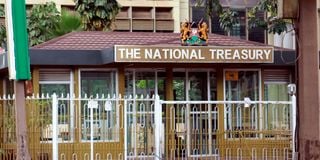
The National Treasury Building in Nairobi.
The government is planning to slash the budget by a further Sh214.2 billion if the decision by the Court of Appeal to void the Finance Bill 2023 is upheld by the Supreme Court, the Treasury has revealed in court documents filed in appeal to the ruling.
Sources at the Treasury had said on Thursday that the expected revenue hit would amount to Sh164 billion, but an affidavit sworn in support of the appeal by Treasury Principal Secretary Chris Kiptoo, outlined the higher amount and provided a breakdown of the key expenditure items to be slashed to cover the budget hole.
The education sector will take the biggest hit of Sh71.4 billion in the potential spending cuts, targeted at key spending items such as the hiring of junior secondary school teachers on permanent and pensionable terms (Sh18 billion), Helb Loans (Sh10 billion), secondary schools’ capitation (Sh18 billion), scholarships (Sh16.9 billion).
Others are free primary education at Sh4 billion, and capitation for Tvet and technical training institutes at Sh4.5 billion.
The government has also pencilled in a cut of Sh59 billion in the allocation towards payment of interest on public loans, signalling a potential default on its obligations, while pensions and gratuities face a Sh20 billion hit.
These cuts on education and debt service form the bulk of projected revisions of Sh156.42 billion in the recurrent budget. The development vote is in line for a cut of Sh47.7 billion, led by the roads budget (Sh20 billion), water and irrigation (Sh10 billion), fertiliser subsidy programme (Sh7.5 billion), and universal healthcare (Sh6.17 billion).
The Hustler Fund allocation will also be cut by Sh2 billion, the PS said in his court filing, as is the allocation to county aggregation industrial parks. The devolved units are also in line for a cut of Sh10 billion in their equitable share of revenue which is currently pegged at Sh380 billion.
On Wednesday, the Court of Appeal nullified the Finance Act 2023, terming it unconstitutional on grounds that the supreme law of the land was regularly ignored in passing the Act, particularly in the introduction of items that were not subjected to public participation.
Also Read: Stop budget cuts in health
The Treasury’s swift move to file a notice of appeal at the Supreme Court and seek a stay on the Court of Appeal decision is reflective of the fiscal headache it faces due to the deletion of two successive Finance laws.
“The situation at hand further precipitates a constitutional crisis by placing reliance on a previous legislation, the Finance Act of 2022, as the government is currently using the tax regime under the Finance Act 2023 due to the fact that the Finance Bill 2024 was recently rescinded after countrywide protests and unrest,” said Dr Kiptoo in his affidavit.
“Unless this honourable court grants a stay…there is a real danger that the effect of the judgment will eventually and potentially lead to a total shut-down of government.”
The 2023 Finance Act had increased a number of taxes, most notably doubling the VAT on fuel from eight percent to 16 percent, and raided the payslips of top earners with new tax bands of 32.5 percent and 35 percent on income above Sh500,000 per month.
The 2023 Finance Act helped the government raise its tax collection by Sh193 billion to Sh2.223 trillion in the just-ended 2023/2024 fiscal year, as per filings made by the Kenya Revenue Authority (KRA) last month.
There are however some taxes that will go up as a result of the reversal of the 2023 clauses, including a return to a 20 percent excise rate from 15 percent on mobile data, airtime, and bank cash transfer charges.
Monthly rental tax goes back to a rate of 10 percent from 7.5 percent, while electric motorcycles, locally assembled mobile phones, electric buses, and animal feed manufacturing inputs will return to a standard VAT rate of 16 percent from the current zero rated status.
The deletion of the 2024 Finance Bill meanwhile handed the government a financing deficit of Sh346 billion, bringing the total tax hole resulting from the loss of the two finance laws to Sh560 billion.
The Treasury has already tabled before Parliament a supplementary budget to adjust its spending and borrowing plans to the expected tax losses from the deletion of the Finance Bill 2024.
Similar to the proposed cuts in the new affidavit, the Supplementary Budget I for 2024/2025 hit the education sector the hardest with cuts of Sh30 billion, followed by Energy at Sh18.5 billion and roads at Sh14 billion.
Overall, the cuts are meant to reduce the Sh3.92 trillion budget by Sh156.4 billion, with the remainder of the revenue hole to be filled by borrowing.












